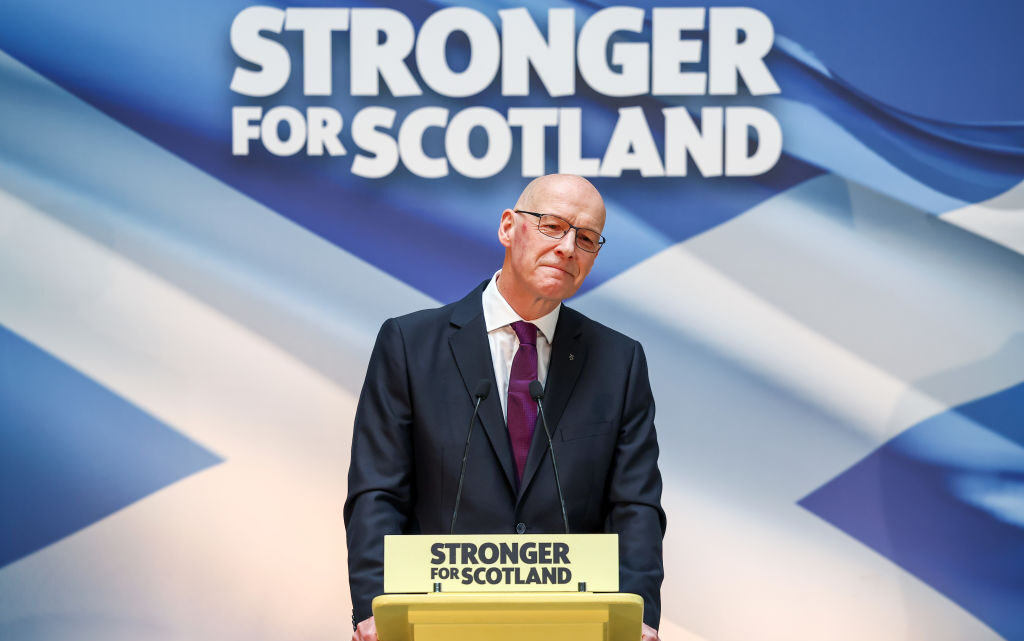“It’s a welcome opportunity to remove the Tory government and to put Scotland first,” Scottish First Minister John Swinney said yesterday evening of the upcoming general election. Whether his SNP MPs welcome an immediate confrontation with Scotland’s voters is not obvious, however. A July poll is far from ideal timing for the Scottish Nationalists.
Swinney has been in office for only two weeks. While he and deputy Kate Forbes have steadied the listing Nationalist ship in Scotland in the wake of Humza Yousaf’s resignation earlier this month, the SNP is some way from being election-fit.
To begin with, the party is still reeling from 16 months of chaos. A six-week campaign will not be long enough for Swinney to show the Nationalists have moved on from the turmoil that’s led to two leaders quitting, not to mention a series of damaging internal splits. A poll last week put Labour fully 10 points ahead, with the SNP down four points since April — the electoral price it has paid for Yousaf’s self-immolation. In a national contest involving dozens of marginal seats, the hangover from that could be decisive.
The SNP is also understood to be seriously short of cash in the wake of its internal difficulties (the police investigation into its finances, Operation Branchform, still looms in the background). That’s in stark contrast to Scottish Labour, which reportedly has £500,000 in the bank ready to splash on the campaign to come.
So, financially, an early campaign won’t help the SNP’s cause, but there is a deeper factor at play as well. It’s worth remembering that in the distant past prior to the 2014 independence referendum, the party struggled to get noticed at Westminster elections, drowned out by the more significant UK-wide red vs blue face-off (Scotland gets the 10 o’clock news the same as everyone else).
That changed in 2014, when the politics of Scottish national identity trumped everything else. A decade later, though, and with the SNP suffering the wear and tear that comes with 17 years in government, there is evidence that things are shifting once again. Following a detailed poll for the Tony Blair Institute last year, the veteran pollster Peter Kellner concluded this year’s election contest may be the first since the referendum when “competence not the constitution” is front and centre. Older political norms are beginning to reassert themselves. If the SNP struggles to own the political narrative in Scotland, it could lose big, with Labour scooping as many as 30 seats.
Swinney can at least begin the campaign in the knowledge that he is relatively popular: 35% of voters gave him the thumbs up last week, ahead of Labour’s Anas Sarwar (26%) and the Tories’ Douglas Ross (19%). If he can convince pro-independence voters and core SNP supporters that they need to come out to keep The Cause alive, he may still have a chance of limiting the damage.
But are independence supporters convinced that’s what the SNP is doing? One Labour candidate tells me he is encountering deeply unhappy Nationalist supporters who feel the SNP has failed to push independence forward. As happened in the Rutherglen by-election last year, many may stay at home.
A silver lining for Swinney is that no matter how bad the result on 4 July turns out to be, it can hardly be blamed on his fledgling leadership. That, however, will be of little comfort to SNP MPs making their way back to their constituencies this weekend for the fight of their political lives.











Join the discussion
Join like minded readers that support our journalism by becoming a paid subscriber
To join the discussion in the comments, become a paid subscriber.
Join like minded readers that support our journalism, read unlimited articles and enjoy other subscriber-only benefits.
Subscribe